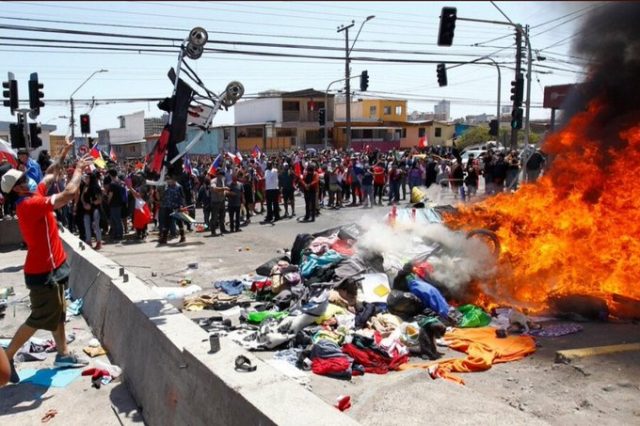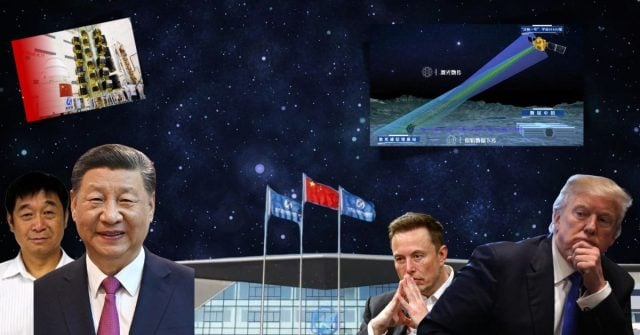The photo of a baby carriage thrown into the flames was one of the images left by a xenophobic march against Venezuelan migrants in Chile, which was attended by some 5,000 people from the city of Iquique, capital of the Tarapacá region. That photo brought to mind thousands of unfortunate moments that Chileans suffered firsthand during the Pinochet dictatorship, a systematic persecution that even drove hundreds of Chilean families to take refuge in Caracas to save their lives.
The mobilization, which took place last Saturday, was called in repudiation of the migrant community living in the north of Chile, mostly made up of Venezuelans, took place from Plaza Prat to the headquarters of the Regional Government of Taracapá, describes a report from RT.
«No more migrants», «No more illegal (people)» and «Chile is a republic that is to be respected» were the slogans that those attending the demonstration carried on their placards, who not only attended because they felt identified with a speech of hate but also perpetrated direct attacks against the population residing in an irregular administrative situation.
Part of the protesters, who formed a mob, stole belongings of the migrants who were in the vicinity of Avenida Aeropuerto with Las Rosas, such as tents, sleeping bags and clothing, and set them on fire. While the objects were incinerated, the organizers rang pots, threatened the migrant population that lived on the streets and chanted xenophobic slogans.
The violent attack prompted the Chilean Prosecutor’s Office to initiate an investigation and to have «protection measures for the victims», including at least 16 people, among which were children and the elderly, who lost their few belongings and had to sleep in the street.
«Inadmissible»
The governor of Tarapacá, José Miguel Carvajal, blamed the Chilean government for the ‘migration crisis’ in the region he leads and called on the population not to commit “any xenophobic act”. «We are not what is seen in the images today», he asserted.
However, the attacks on the population in an irregular administrative situation led to the pronouncement of the United Nations Special Rapporteur on the human rights of migrants, Felipe González Morales, who described what happened in northern Chile as an «inadmissible humiliation».
«The xenophobic discourse, assimilating migration to crime, which unfortunately has become more and more frequent in Chile, feeds this kind of barbarism», he stated.
This Monday, in statements to Tele13 Radio, the Minister of the Interior and Public Security, Rodrigo Delgado, described Saturday’s event as «regrettable and reprehensible», although he promised that the eviction policy and «the expulsion plan» of the people in an irregular situation would be maintained.
«As a government, we are never going to endorse the use of force, of violence, as a measure of conflict resolution», said Delgado, and announced that those who organized this manifestation of hatred «will respond to justice, as it corresponds».
Meanwhile, the United Nations (UN) office in Chile expressed «its concern about violence and xenophobia towards migrants» during a meeting with the authorities of the Chilean Foreign Ministry, who urged them to «act within the framework of the respect for human rights and international humanitarian law”.
Prior ‘eviction’ and crossing between Chilean authorities
The demonstration and the acts of violence occurred a day after the Carabineros evicted migrant families from Plaza Brasil in Iquique, where they had been staying for just over a year.
The governor of Tarapacá assured that neither he nor the local authorities were aware of this eviction, which left several families adrift, which caused them to end up wandering around the city and concentrated in other areas, in a kind of makeshift camps.
For his part, Minister Delgado questioned Carvajal’s actions and recalled that weeks ago there was a meeting with the Tarapacá authorities in which it was agreed that the Executive would take charge of security and the Government would be responsible for the «humanitarian situation» .
«That was an agreement and after a few weeks what do we have: only criticism and ignorance of the verbal commitment», said the official.
Last Sunday, the governor of Tarapacá said that organizations and volunteers had relocated part of the migrant population, especially children and women in some parts of Iquique, but he acknowledged that the action is still insufficient.
The pronouncement of Venezuela
«Venezuela repudiates the xenophobia and the attacks against Venezuelan migrants and demands that the national and local authorities of Chile respect the physical and psychological integrity of our nationals», wrote the Venezuelan vice president, Delcy Rodríguez, in her Twitter account.
Likewise, she announced that, by order of President Nicolás Maduro, the Plan Vuelta a la Patria (Plan Repatriation to the Homeland) will be activated for the repatriation of Venezuelans from Chile.
On Monday afternoon, the vice president also offered a press conference in which she reiterated the request for respect for her fellow nationals by the Chilean authorities and recalled that Venezuela «has been a country open in receiving migrants from Europe, America and particularly From Chile».
“When Pinochet’s terrible coup against Salvador Allende, Venezuela opened its doors to Chileans. And it is inconceivable what is happening now, the persecution, xenophobia, hatred against our migrants in Chile», said Rodríguez, who recalled that President Sebastián Piñera «in an act of demagoguery» called on the Venezuelan population to emigrate to Chile.
In 2018, while friction between the Government of Chile and Venezuela intensified, Piñera announced the creation of a special visa for Venezuelans who wanted to emigrate to his country, and that would allow them to have a temporary residence permit.











